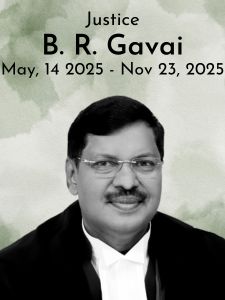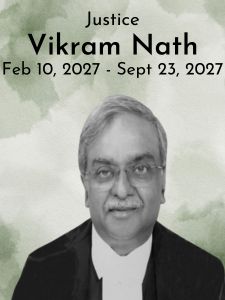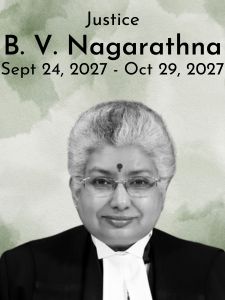Analysis
Next 8 Chief Justices of India
If the seniority principle is followed, these 8 Judges will lead the Supreme Court of India as Chief Justice till 2031.
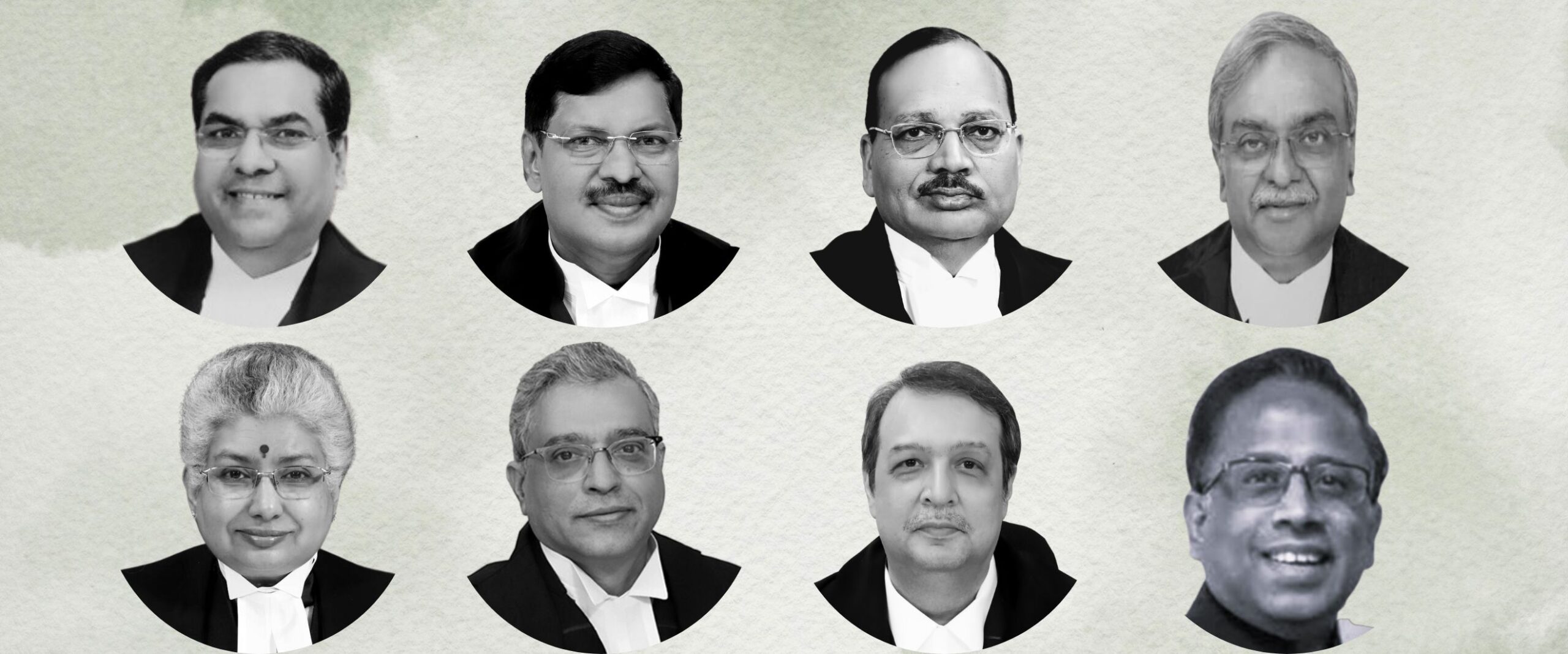
Often described as the ‘first among equals’, the Chief Justice of India leads the Supreme Court and its Judges. The CJI is the ‘Master of Roster’, and is tasked with constituting benches of two or more judges and assigning cases to those benches.
The Chief Justice is typically appointed as per the principle of seniority. They head the SC Collegium, which recommends appointing judges to the SC and High Courts. They have a wide range of administrative tasks, which affect the day-to-day functioning of the SC.
The incumbent CJI D.Y. Chandrachud will retire on November 10th, 2024 after holding office for 2 years. Other than Justice J.B. Pardiwala who will hold office for over 2 years and 3 months, none of the next 8 CJIs are expected to enjoy a tenure longer than 1 year and 2 months (Justice Surya Kant).
Justice Sanjiv Khanna
Justice Sanjiv Khanna will assume office as the CJI on November 11th, 2024 for a term of 6 months till his retirement on May 13th, 2025.
He was elevated to the SC from the Delhi HC in January 2019. He is currently on the roster for company law, arbitration, service law, maritime law, civil law, and commercial law, among others. In his four-and-a-half-year tenure so far, Justice Khanna has been a part of 358 Benches and authored over 90 judgements*.
In 2023, he authored the Constitution Bench (CB) judgement in Shilpa Sailesh which held that the SC could directly grant a divorce on the ground of irretrievable breakdown. In UOI v UCC he was part of the CB that rejected the Union’s curative petition seeking additional compensation for the Bhopal gas tragedy victims. In an application filed by the Union against the SC’s judgement in Joseph Shine (2018) a 5-Judge Bench comprising Justice Khanna, unanimously held that the judgement did not apply to members of the armed forces.
Last year, he was part of the 3-Judge Bench which looked into whether reservations for SCs and STs should extend to promotions. Along with Justice L.N. Rao, he held that reservations in promotions must be granted per cadre, and not the service as a whole.
In 2019, he authored the majority opinion in the famous ‘RTI Judgement’ and held that judicial independence must not stand in the way of transparency and accountability. In 2022, he held that arbitrators could not unilaterally decide their fees.
Justice B.R. Gavai
Justice B.R. Gavai is set to become the CJI on May 14th, 2025 for a term of little over 6 months till November 23rd, 2025. He was elevated to the SC from the Bombay HC in May 2019. Justice Gavai is the first Scheduled Caste Judge to serve at the Supreme Court since Justice K.G. Balakrishnan’s retirement in 2010.
Justice Gavai is on the SC roster for land acquisition, service law, criminal law, and consumer protection-related matters.
In his 4-year tenure so far, he has authored 148 judgements and been a part of 429 Benches. Earlier this year, a CB led by Justice Abdul Nazeer upheld the Union’s 2016 Demonetisation Scheme. The same Bench also held that public officials cannot be liable for every statement or opinion they express.
Recently, he led a 3-Judge Bench which reserved judgement in a case challenging the repeated tenure extensions of CBI and ED Directors.
He was on the 9-Judge Bench which heard the Sabarimala review petition and Parsi excommunication cases.
Justice Surya Kant
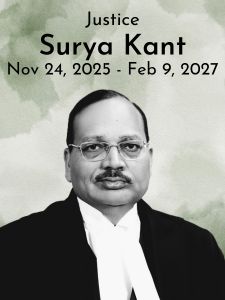 Justice Surya Kant will serve as the CJI for 1.2 years from November 24th, 2025 to his retirement on February 9th, 2027.
Justice Surya Kant will serve as the CJI for 1.2 years from November 24th, 2025 to his retirement on February 9th, 2027.
He was elevated to the SC in May, 2019. Interestingly, he superseded 11 judges more senior at the time of his appointment. The SC Collegium admitted to recommending his name over others to ensure representation from his parent High Court of Punjab and Haryana.
Currently, Justice Kant is on the roster for criminal, family and election-related matters amongst others. In his two-year tenure so far, he has been a part of 319 Benches and has authored 55 judgements.
Last year, he was part of the Bench where the SC upheld the ‘one-rank-one-pension’ scheme. He was also on the Bench in the case where the SC held that arbitrators could not unilaterally decide their fees.
In 2019, he authored the unanimous decision of the 3-Judge Bench that held that ‘life imprisonment’ under the Indian Penal Code, 1860 was not restricted to 20 years.
He was also on the 9-Judge Bench for Sabarimala Review petition along with Justice Gavai. The case remains pending.
Justice Vikram Nath
Justice Vikram Nath will occupy the office of the Chief Justice from February 7th, 2027 to September 23rd, 2027. His tenure will span nearly 8 months.
He was elevated to the SC in August 2021. His parent HC is the Allahabad HC. He is currently on the roster for labour law, service law and civil law-related cases.
Since his appointment to the SC, Justice Nath has been a part of 180 Benches and has authored 40 judgements in almost 2 years so far.
He has been a part of several Constitution Benches of the SC. These Benches have held that the SC can directly grant a divorce on the ground of the irretrievable breakdown of a marriage. They have also referred the ex-communication of the Dawoodi Bohra community members to a 9-Judge Bench. The same Bench rejected the Union’s curative petition seeking additional compensation for the Bhopal Gas Tragedy victims.
Justice B.V. Nagarathna
Justice B.V. Nagarathna will be the first woman Chief Justice of India. However, her tenure will span only 36 days from September 24th, 2027 to October 29th, 2027.
She was elevated to the SC in August 2021 from the Karnataka HC. In her nearly two-year tenure so far, she has authored 53 judgements and been a part of 366 Benches.
She has authored dissenting opinions in the CB case in the challenge to the Union’s 2016 demonetisation scheme. She authored a separate opinion in the Azam Khan- Freedom of Speech case.
She authored the unanimous judgement which held that public servants could be held liable for bribery based on circumstantial evidence.
Last year, she was on the Bench that declared that reservation for Vanniyars within the Most Backward Classes category was unconstitutional.
Justice P.S. Narasimha
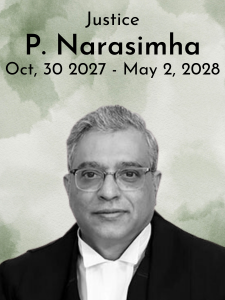 Justice P.S.Narasimha will be the 3rd SC Judge directly elevated from the Bar to become the Chief Justice, after CJIs S.M. Sikri and U.U. Lalit.
Justice P.S.Narasimha will be the 3rd SC Judge directly elevated from the Bar to become the Chief Justice, after CJIs S.M. Sikri and U.U. Lalit.
He was elevated to the SC in August 2021. He will assume office on October 30th, 2027 for a little over 6 months till May 3rd, 2028.
In his two-year tenure so far, he has been a part of 169 Benches and has authored 40 Judgements. He was part of the 5-Judge Bench that held the Governor was wrong to call for Mr. Uddhav Thackeray’s floor test in Maharashtra. The same Bench also held that in the NCT of Delhi, it was the Delhi State Government that could control ‘services’ and not the Union.
Justice Narasimha was part of two 5-Judge CBs which reserved judgement in the applicability of the ‘group of companies’ doctrine in India and the plea for marriage equality.
Justice J.B. Pardiwala
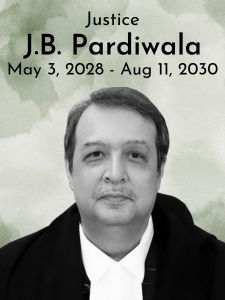 Justice Pardiwala will assume office of the Chief Justice on May 3rd, 2028. He will serve a tenure of 2 years and 3 months as CJI till August 11th, 2030. He is the 4th Parsi Judge of the SC and was elevated from the Gujarat HC on May 9th, 2022. He will be the only CJI on this list to hold the office for at least 2 years.
Justice Pardiwala will assume office of the Chief Justice on May 3rd, 2028. He will serve a tenure of 2 years and 3 months as CJI till August 11th, 2030. He is the 4th Parsi Judge of the SC and was elevated from the Gujarat HC on May 9th, 2022. He will be the only CJI on this list to hold the office for at least 2 years.
In his one-year tenure so far, Justice Pardiwala has been a part of 95 Benches and has authored 36 judgements. Benches he has been a part of have delivered judgements on the EWS reservation scheme and the uniform marriage age.
He is also part of the 5-Judge Constitution Bench that reserved judgement in the case about the applicability of the ‘group of companies’ doctrine in India.
Justice K.V. Viswanathan
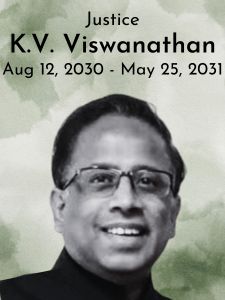 Justice K.V. Viswanathan will be the 4th SC judge directly elevated from the Bar to become the CJI in August, 2030. He will serve as CJI for close to 10 months till his retirement on 25th May, 2031.
Justice K.V. Viswanathan will be the 4th SC judge directly elevated from the Bar to become the CJI in August, 2030. He will serve as CJI for close to 10 months till his retirement on 25th May, 2031.
He was designated as a Senior Advocate in 2008. Since then, he has represented parties in several high-profile cases, such as the challenge to WhatsApp’s privacy policy and the plea for marriage equality.
He was also the Court’s Amicus in cases such as the challenge to tenure extensions of the CBI/ED Directors and the SC’s monitoring of judicial appointments in lower Courts.
*The data source for all judges is Manupatra Advance Judge Analytics. The data was collected on 22nd June, 2023.


